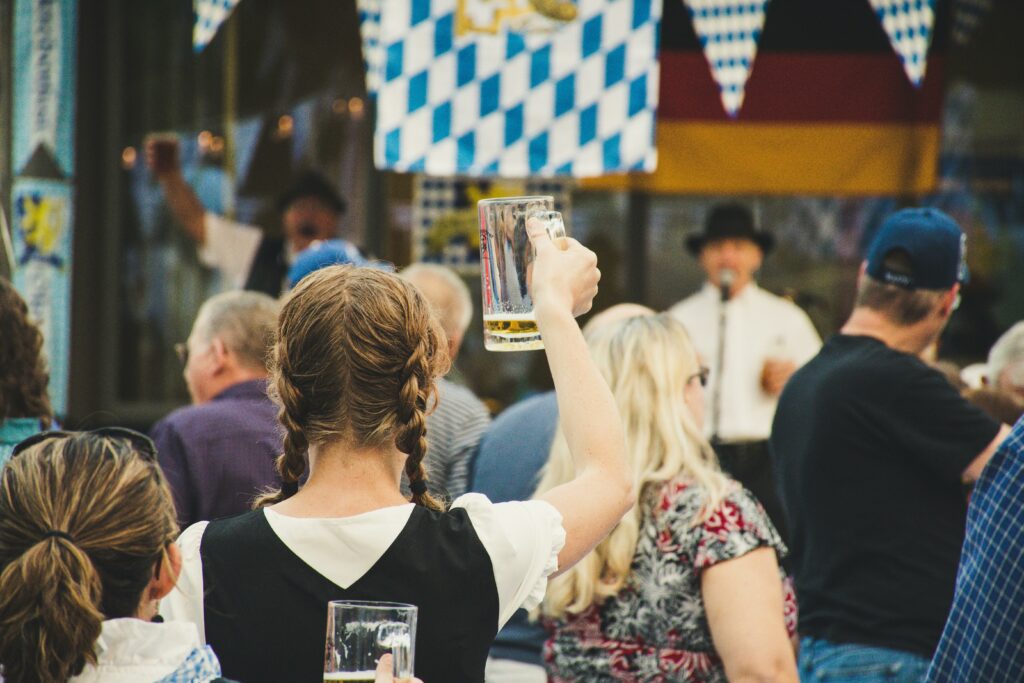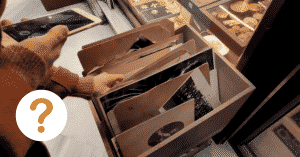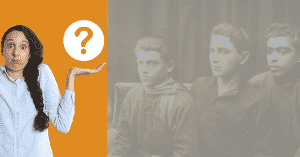Visiting Oktoberfest today means participating in a centuries-old folk festival that offers so much more than the chance to sample Germany’s finest brews.
With carnival rides to thrill, amusements that date back generations, and the majestic parade of brewers, there’s something for everyone.
Whether you’re planning your visit meticulously or just hoping to soak in the ambiance, knowing the ins and outs of this massive event is key to enjoying all the festivities without a hitch. And while you’re navigating the exhilarating chaos, safety is also a top priority, ensuring you can revel in the merriment with peace of mind.
History of Oktoberfest
Let’s take a stroll down memory lane to the beginnings of the world-renowned Oktoberfest. Imagine the sights and sounds of a festival so grand it has captured hearts for centuries. Ready for the journey?
Munich’s Folk Festival Roots
Cast your mind back to the early 19th century, Munich was abuzz with anticipation. The air was filled with the promise of something spectacular, a celebration that would ignite a tradition lasting beyond mere generations.
King Ludwig I and Princess Therese of Saxe-Hildburghausen were about to tie the knot, and the whole of Bavaria was invited. On the verdant fields named Theresienwiese, in honor of the bride, a horse race marked the first chapter of a folk festival that we now know as Oktoberfest.
From Royal Wedding to Public Festival
What began as a nuptial festivity in 1810, turned into an annual affair, swiftly gaining traction among the public. Can you imagine the sight of locals and nobility cheering side by side? That’s the spirit of inclusivity and merriment that defines Oktoberfest.
After all, what’s better than a communal celebration that unites through music, dance, and good cheer? The transition from royal event to public gathering wasn’t just a decision; it was a cultural embrace, transforming the festival into a staple of Munich’s collective identity.
Historical Milestones of Oktoberfest
Now, hold on to your hats—there have been ups and downs along this historical rollercoaster. The Napoleonic Wars, a period packed with conflict and turmoil, could’ve halted the festivities. Yet, Oktoberfest showed resilience.
Fast forward to the 20th century, and the world was a different place. World War I put a damper on the celebrations, but just like a phoenix, Oktoberfest rose from the ashes, evolving with each passing year.
The history of this festival isn’t just about beer and revelry; it’s a tapestry woven with over 200 years of trials, jubilations, and the unyielding spirit of a festival that has become an emblem of cultural kinship.
Oktoberfest Today
Imagine strolling through the vast Theresienwiese, heart pounding with anticipation, as the soul of Munich transforms into a bustling world of traditional beer tents and lively parades. That’s the modern Oktoberfest experience.
Modern Celebrations
Can you hear the oompah bands and clinking mugs? Each year, Oktoberfest faithfully revives age-old traditions with a contemporary flair.
Picture the vibrant costumes, the air mingling with savory aromas, and the unmistakable taste of Bavarian brews. It’s a festival where the past and present dance together in a cheerful celebration.
Festival Size and Visitors
How big, you ask? Oktoberfest proudly holds the title as the world’s largest public festival, attracting over six million visitors from around the globe.
They converge upon Munich, eager to dive into the festivities and all that the iconic beer festival has to offer.
Economic and Cultural Significance
Let’s talk impact. Economically, Oktoberfest is a juggernaut for Munich, echoing the clatter of millions of euros changing hands. Culturally, it’s a showcase of Bavarian heritage and joyous national pride that resonates long after the last tent has been packed away.
This isn’t just a festival; it’s a testament to the city’s ability to welcome the world with open arms, cementing relationships as naturally as toasting with an old friend.
Bavarian Traditions and Customs
When you think of Bavaria during Oktoberfest, images of vibrant costumes and delicious food immediately come to mind. Each custom is steeped in history and is as essential to the festival as the beer itself.
Traditional Attire
Imagine strolling through the festival, the sound of cheerful chatter surrounding you, and there you see it—the iconic Lederhosen for men and the graceful Dirndl for women.
These are not just outfits; they are a proud display of Bavarian culture. The Lederhosen, durable leather pants, are as much about comfort as they are about tradition, while the Dirndl with its embroidered apron and bodice tells a tale of heritage in every thread.
Oktoberfest Parades
The sound of brass bands fills the air; you can’t help but strain your neck to see the famous Oktoberfest Parades. Leading the festivities is the Traditional Costume Parade on the first Sunday, where Munich becomes a tapestry of history in motion.
Horse-drawn carriages, cultural groups dressed in regional costumes from all over Germany, and floats rich with decorations invite you to be a part of the history.
Bavarian Food and Delicacies
Can you smell the rich aroma wafting through the air? Bavarian cuisine is a hearty affair.
Your palate will certainly be tempted by the Bratwurst, Pretzels, and Sausages. Make sure you try the Roasted Chicken—a crispy, golden delight.
This is not just food; it’s a culinary rhapsody, each bite a delicious nod to the craftsmanship of generations of Bavarian chefs.
The Beer Tents and Breweries
When you step into the immense festival grounds of Oktoberfest, you’re stepping into a tradition steeped in history. The beer tents and breweries of this celebrated Munich event are the pulsing heart of the festivities, where centuries-old brewing traditions meet the lively spirit of communal celebration.
Major Beer Tents
Imagine a place where the music’s playing, people are dancing on benches, and the air is filled with a chorus of toasts. The Oktoberfest beer tents are exactly that.
Each tent is a microcosm of Bavarian culture, with favorites like the Armbrustschützenzelt, where marksmen show off their skills, and the Schottenhamel, the incubator of the entire Oktoberfest, since it’s here that the festival officially starts with the tapping of the first beer barrel.
Famous Munich Breweries
In Munich, brewing is more than a craft; it’s heritage. And this is nowhere more evident than at Oktoberfest.
Each brewery represented here, from the iconic Hofbräu to the venerable Augustiner, serves up its rich history in a stein. With brewing traditions that often date back to the medieval era, these Munich-made beers are a testament to the city’s enduring love affair with the craft.
Beer Selection and Brewing Traditions
Did you know that the beers at Oktoberfest aren’t just any beers? By tradition, they must adhere to the Reinheitsgebot, a Bavarian Purity Law from 1516, dictating that only water, hops, and barley should be used.
It’s a commitment to purity that you can taste in each sip. And just for fun, imagine holding a wooden keg — that’s how the Augustiner beer comes to your table, making it a unique experience among the Oktoberfest tents.
Carnival Rides and Amusements
When you think of Oktoberfest, what comes to mind? Is it just the frothy mugs of beer and the traditional Bavarian lederhosen?
Thrilling Rides
Imagine the rush of the wind as you soar through the air, the adrenaline pumping through your veins. That’s what you get with the heart-stopping rollercoasters at Oktoberfest.
The Olympia Looping roller coaster, for instance, with its gravity-defying loops, is a favorite among adrenaline junkies.
And let’s not forget the giant Ferris Wheel, offering not just a ride, but a panoramic view of the festival that will take your breath away. Can you smell the excitement in the air?
Family-Friendly Attractions
Now, if you’ve got little ones in tow or you’re a fan of the gentler side of fun, the carnival side of Oktoberfest is peppered with family-friendly attractions.
Take the nostalgic carousel – it’s a classic that brings a smile to everyone.
For some whimsical flying fun, the Wellenflug – a popular swing carousel – spins you around and lifts you high, all with that charming Bavarian backdrop.
And hey, don’t you want to leave with stories that’ll have the grandkids wide-eyed in wonder?
Planning Your Visit
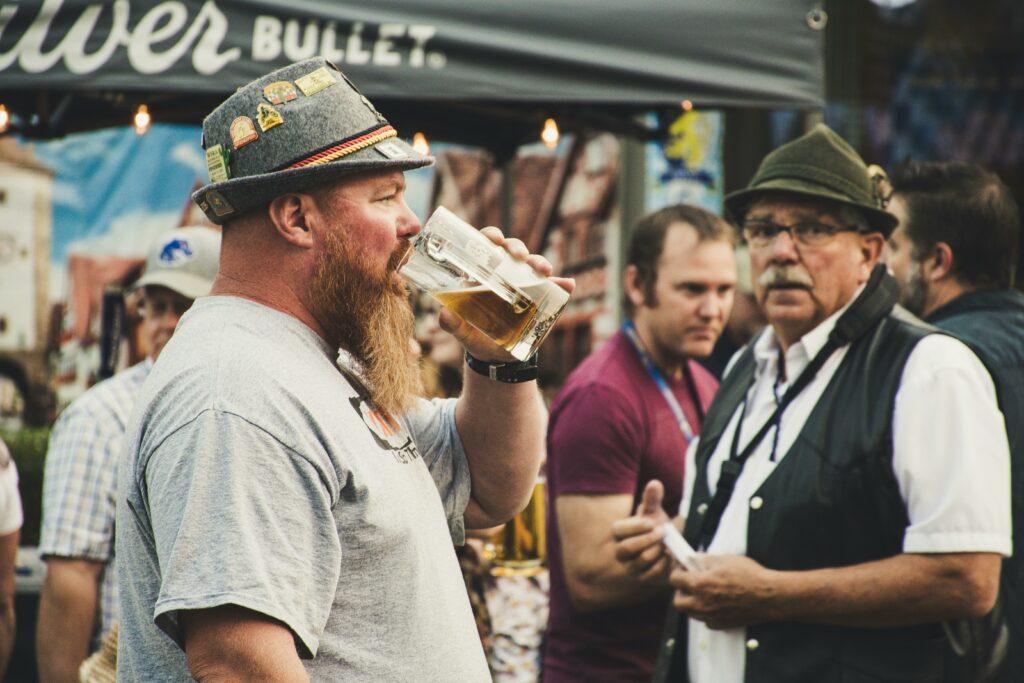
When the vibrant hum of Munich’s grandest fest calls, are you ready to immerse in the cheerful chaos of the world’s most renowned beer celebration?
This section equips you with the essentials to navigate your journey—the where’s and how’s of savoring Oktoberfest to the fullest.
Accommodation and Reservations
Securing a place to stay is akin to finding that prized bottle of limited-edition brew—both fulfilling and essential.
Think ahead and lock in your lodging months in advance. Hunting for a room last minute? Think again! Those millions making their trek to Munich aren’t snoozing on reservations.
Consider booking within a shout’s distance to the festival grounds, or if you’re one who favors quieter nights, a short ride on the public transport will do the trick.
- Hotels & Guesthouses: Plentiful but snap up fast.
- Airbnb & Rentals: A homey twist to your stay—early booking advised.
Do you fancy an authentic Oktoberfest experience? Lock in those table reservations in your favorite beer tent, especially if your crew rolls deep.
Transportation and Accessibility
How about we leave the car behind?
Munich’s public transport service is top-tier, with the S-Bahn, U-Bahn, and bus networks escorting you right to the heart of the festivities.
With a special events timetable providing frequent and late-night services, you’re covered, whether it’s time for the first pour or the last hurrah.
- S-Bahn/U-Bahn: Brings you close to the action at Theresienwiese Station.
- Buses: Ample routes for that doorstep drop-off.
Remember, a tourist’s savvy lies in their ticket—a day pass might be your best bud, letting you hop on and off without the ticket booth tangle. Can you already hear the oompah band?
Safety and Regulations
When you pack for Oktoberfest, you’re not just stuffing lederhosen and dirndls into your suitcase – you’re preparing for an experience! But let’s talk about what really matters: keeping that experience safe and sound, and making sure you play by the rules.
Security Measures
Security at Oktoberfest isn’t just about looking out for the guy who’s had one too many. It’s a well-oiled machine.
Picture this: comprehensive security concepts developed by the City of Munich and the police, ensuring everyone can revel with peace of mind.
- Checkpoints: All festival entries monitored with bag checks.
- Prohibited Items: Large bags, dangerous items.
- Surveillance: CCTV operation across the festival grounds.
Alcohol Consumption and Conduct
Grabbing a beer at Oktoberfest? Well, that’s the point, isn’t it? But hold your horses—there are regulations.
Oktoberfest is all for fun, but it’s not the Wild West. You’ve got to handle your hops responsibly.
- Drinking Age: 16 for beer and wine, 18 for spirits.
- Behavior: Rowdiness, and causing a scene can lead to a swift escort out.
- Safety Tip: Pace yourself!Endless steins aren’t a challenge, they’re a choice.
Impact and Press
As millions flock to the festival and hoist their steins, the reverberations of Oktoberfest are felt far beyond the beer tents. From extensive media coverage to boosting Munich’s economy, let’s tap into how this event makes its mark.
Media Coverage and Press
Every year, Oktoberfest garners a deluge of media attention, making headlines across the globe.
Can you guess why? Well, capturing scenes of traditional lederhosen and dirndls, alongside the lively atmosphere and clinking glasses of beer, offers an irresistible story for news outlets and magazines.
Contacts in the press have their hands full, with the event providing a wealth of culturally rich and visually enticing content for their anxious audiences back home.
Economic Impact on Munich
Financially, the city of Munich cheers ‘Prost!’ to the event.
You might find it staggering, but Oktoberfest is a major economic powerhouse, funneling millions of euros into the local economy.
From hotel bookings to the sale of those iconic pretzels the size of steering wheels, we’re talking a significant cash injection.
Oktoberfest creates jobs, fills up the coffers of local businesses, and quite literally keeps the city buzzing with life and commerce. Isn’t it fascinating how a folk festival turns into an economic triumph year after year?
Cultural Significance
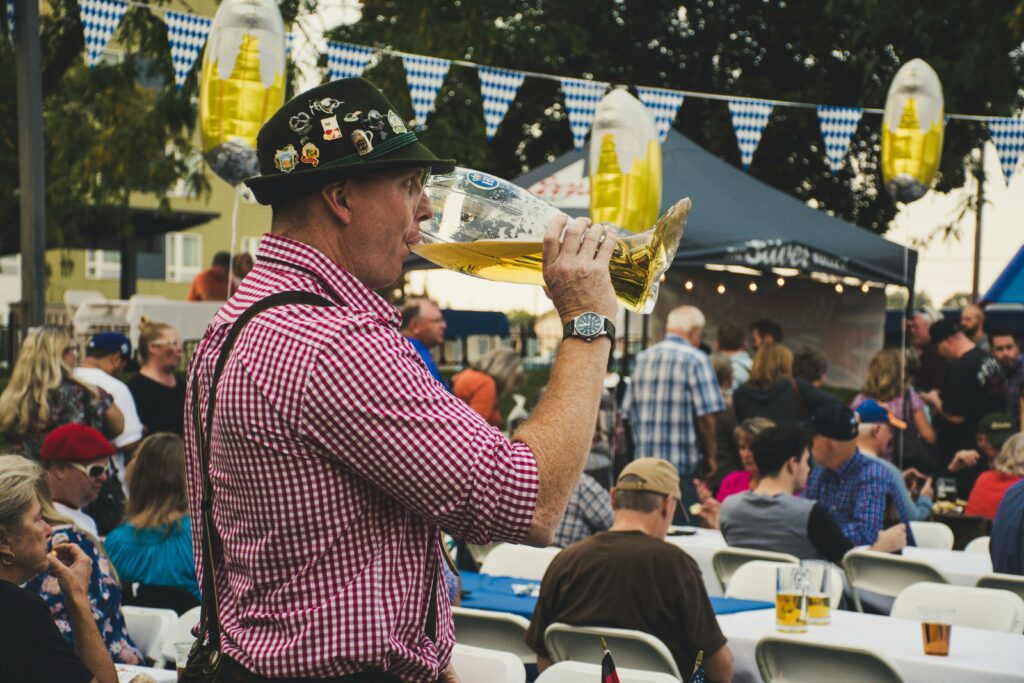
When you think of Oktoberfest, what springs to mind? Is it just a raucous beer festival, or is there more to this event that has captured hearts worldwide?
It’s a genuine slice of Bavarian culture, transformed into a global phenomenon.
Oktoberfest’s Influence on Culture
Did you ever wonder how a local Bavarian tradition became iconic, resonating so far beyond its origins?
Oktoberfest’s roots dig deep into the soil of Bavarian culture.
Imagine the spirited oompah bands, the hearty clink of beer steins, and the distinctive lederhosen and dirndl attire. These cultural markers have become symbols of the celebratory spirit of Munich, inviting people from all walks of life to partake in the joy.
The festival is not merely an event; it’s a showcase of tradition, a nod to continuity and community that has been going strong since its inception in 1810.
Global Celebrations
But hold on—why are we talking about Cincinnati and Stuttgart in the same breath as Munich?
It turns out, they are among the many cities that hold their own Oktoberfest celebrations.
Picture thousands of people in Cincinnati, halfway across the world from Germany, munching on pretzels and tapping their feet to polka music.
Or visualize Stuttgart, with its Cannstatter Volksfest, imbued with a similar zest and zeal for enjoying life’s finer moments.
Can you see how a single festival has left its footprints across continents, bringing people together over a shared love for good food, great beer, and even better company? This ripple effect is a testament to Oktoberfest’s profound cultural influence.
Visitor Information
Oktoberfest is much more than just a beer festival; it’s a cultural phenomenon that captures the essence of Bavarian tradition. Whether you’re a seasoned attendee or a first-timer, understanding the nuances of the event can transform a good experience into a great one.
Festival Dates and Hours
Festival Dates:
- Start: September 21, 2024
- End: October 6, 2024
The gates to this vibrant world open on September 21st and promise non-stop celebration until October 6th.
The festival, located at the famed Theresienwiese, beckons visitors from all corners of the globe. Imagine immersing yourself in the festivities, where each day offers a new opportunity to create memories.
The Oktoberfest grounds are open from 10 am on weekdays and 9 am on weekends, and the revelry usually runs until around 11:30 pm.
Tent Opening Times:
- Weekdays: 10:00 AM
- Weekends: 9:00 AM
- Closing: 11:30 PM
Don’t get caught off guard by the swarming crowds, especially on weekends, when the festival becomes a hub of activity.
Service and Amenities
The Oktoberfest experience is complemented by a range of services designed to enhance your visit. It’s not just about indulging in the amber nectar; it’s about enjoyment with ease.
Have you thought about the little things, like where to grab a bite other than a pretzel?
Various eateries offer an assortment of foods, including the famed Bavarian radish, a crunchy snack perfect for accompanying a frothy beer.
Here’s a quick look at what you can expect:
- Food & Drink: A smorgasbord of traditional Bavarian treats.
- Lost & Found: For items lost in the sea of festivities.
- Medical Services: On-site services for those unexpected moments.
- Security: To ensure a safe and joyous experience for all.
Remember, early birds can sometimes snag discounts at certain stalls and smaller tents.
A thorough look at the festival map and guide, available on the official Oktoberfest website, can help plan your day. It’s especially useful if you aim to beat the lines or find the best spot to relax and enjoy the live music.
As for the weather, Munich in late September and early October can be unpredictably charming.
A crisp autumn chill often warrants a warm jacket, so dress in layers to adapt to the changing temperatures as the day progresses into night.
Conclusion
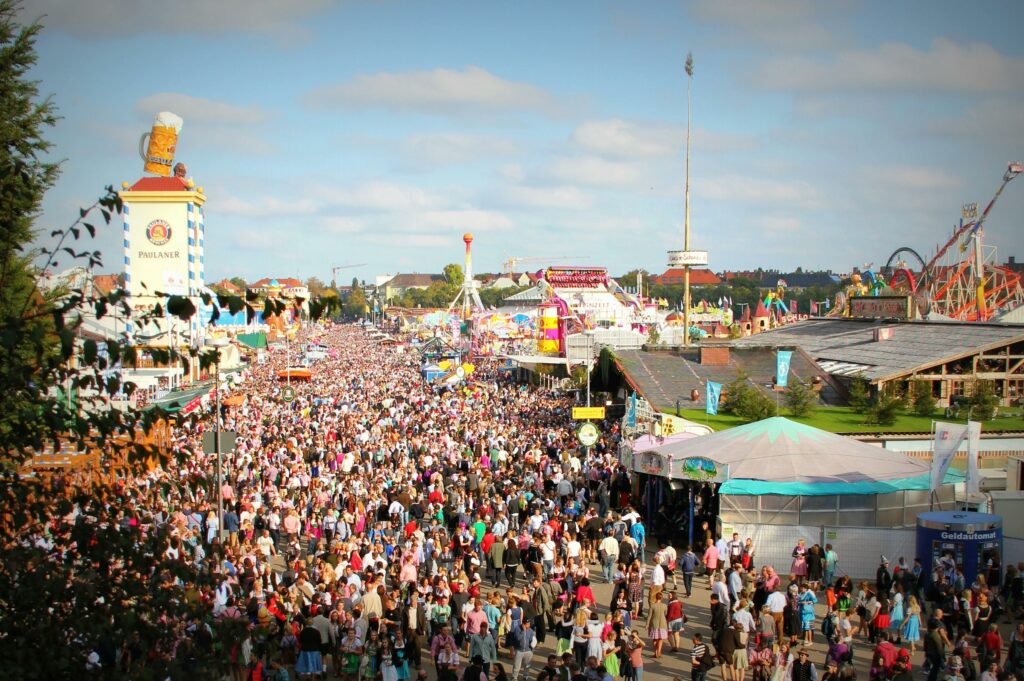
Can you feel the buzz in the air? That’s the unmistakable energy of Oktoberfest. Imagine thousands gathered, steins clinking, and laughter filling Munich’s tents.
This isn’t just a beer festival; it’s a cultural phenomenon, a nod to traditions that have stood the test of time.
Firstly, if you’re a fan of good brews, this festival’s an absolute must.
The variety here isn’t just impressive; it’s a tribute to Bavaria’s rich brewing heritage. Picture raising a glass of the finest Oktoberfestbier, brewed exclusively by Munich’s six major breweries.
But, it’s more than just beer.
You’re enveloped in vivacious tunes from brass bands, the aroma of sizzling sausages, and the sight of traditional lederhosen and dirndls.
The food is as much a draw as the beer; think pretzels bigger than your head and succulent roasted meats.
Let’s not forget the sense of togetherness.
It’s legions of people, side by side at communal tables, sharing stories and making memories. You don’t just observe this camaraderie — you become a part of it.
The festival honors a historical royal wedding, but nowadays, it’s a universal invitation to joy and conviviality.
Need an excuse to let loose and enjoy life with strangers who become friends? Look no further. Oktoberfest awaits with open arms. So, are you ready to join the festivities and create unforgettable memories? Pack your bags, and let’s toast to adventures in Munich!
Frequently Asked Questions
Embarking on the Oktoberfest adventure sparks a flood of queries. Lock in the essentials here to quench your curiosity and ensure an epic rendezvous with Bavarian culture at its finest.
What are the dates for Oktoberfest in Munich for 2024?
The revelry kicks off on September 21 and wraps up on October 6, 2024. Two full weeks to indulge in tradition, hops, and hearty laughs!
How can I purchase tickets for the Munich Oktoberfest 2024?
Good news! Entry to the festival grounds is free; tickets are for rides and attractions only.
For a smooth experience, individual tents may offer vouchers for food and drink in advance.
What is the history behind Oktoberfest and why does it start in September?
The fest honors a royal wedding from 1810. Starting in September takes advantage of milder weather—crisp yet comfortable for stein hoisting and pretzel munching.
How much does the average trip to Oktoberfest in Munich cost?
Can you feel the pinch? Cash flies in a flurry of food and beer, with accommodations soaring. Budget a few hundred euros a day to cover the essentials and indulge in the festivities.
Are reservations required for tables at Oktoberfest in Munich?
It hinges on your squad size and the tent’s popularity.
Smaller groups might snag a spot on the fly, but for guaranteed seating, a reservation is your golden ticket.
Is attending Oktoberfest in Munich a worthwhile experience?
Can you smell the roasted almonds yet?
Imagine being whisked away in lederhosen-clad camaraderie—the pulse of folk music, a feast for the senses.
Priceless!

